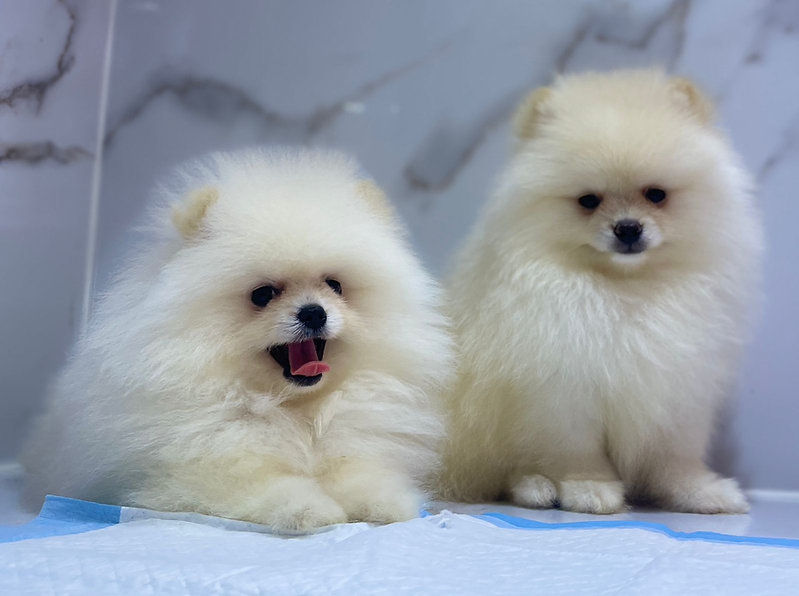What's the Real Deal with Pomeranians?
- Petholicks
- Mar 29, 2025
- 3 min read
Updated: Jun 14, 2025
Pomeranians are more than just cute balls of fluff. These energetic little dogs have a captivating history and a loving nature that make them a favorite among dog lovers. If you are considering welcoming a Pomeranian into your home, it's essential to know about their unique traits, care needs, and social quirks. This post will provide insightful details to help you understand this delightful breed fully.
A Brief History of Pomeranians
Pomeranians originate from larger Spitz breeds found in cold Arctic regions. They take their name from Pomerania, located in northern Europe, where they were initially used for herding livestock and pulling sleds. As they were selectively bred for size, Pomeranians shrank down to become one of the compact members of the Spitz family.
The breed gained immense popularity among European aristocrats in the 18th and 19th centuries. Notably, Queen Victoria of England owned a Pomeranian named Marco, which sparked a trend that saw Pomeranians become fashionable pets among the elite. Today, they remain beloved companions for people from all walks of life.
Physical Characteristics
Pomeranians are small but sturdy, typically weighing between 3 to 7 pounds and measuring 6 to 12 inches tall. Their most notable feature is their luxurious double coat, consisting of a soft undercoat covered by long, straight fur. This fluffy appearance gives them a much larger look than their actual size. Pomeranians come in various colors, including shades of orange, black, cream, and sable.
Their fox-like faces, characterized by pointed ears and bright, dark eyes, add to their charm, making them incredibly appealing to pet owners of all ages.
Temperament and Personality
Pomeranians boast lively and confident personalities. They are alert, intelligent, and often playful, making them charming companions. Despite their small size, their vocal nature can make them effective watchdogs.
Social interaction is critical for Pomeranians; they thrive on human companionship. While they show love to their families, they can be wary of unfamiliar faces. This wariness highlights the importance of early socialization. In fact, studies have shown that well-socialized Pomeranians are 30% less likely to exhibit aggressive behaviors.
Training and Socialization
Training can be both a rewarding and challenging experience with Pomeranians. Their intelligence allows them to learn commands swiftly, but their occasionally stubborn streak may cause some resistance during training. Early socialization is vital for ensuring good behavior as adults.
Using positive reinforcement, such as treats and praise, works wonders for motivating them. Short training sessions, about 5 to 10 minutes, tend to keep their focus sharp. For example, teaching basic commands like "sit" or "stay" during playtime can combine fun with learning.
Grooming Needs
Pomeranians require regular grooming due to their thick double coats. It is recommended to brush them two to three times a week to avoid matting and control shedding. During heavy shedding periods, daily grooming may be necessary to manage loose fur.
While grooming can be time-consuming, it offers an excellent opportunity for bonding. Bathe them approximately every three weeks with a gentle shampoo to maintain a clean, healthy coat. Proper grooming practices can keep their fur vibrant and in good shape.
Health Considerations
Pomeranians are generally healthy dogs, but they can be prone to specific health issues. Common concerns include:
Dental problems: They often require regular dental care, such as tooth brushing, to prevent decay.
Patellar luxation: This knee condition can affect their mobility.
Heart issues: Pomeranians should receive regular vet check-ups to monitor their heart health.
A balanced diet is crucial, as Pomeranians can gain weight easily. In fact, 40% of Pomeranians are estimated to be overweight, contributing to various health issues. Keeping them active and monitoring their food intake can help maintain their health.
Exercise Requirements
Despite their small size, Pomeranians need regular exercise to stay fit and stimulated. Aim for daily walks of at least 30 minutes, along with play sessions that engage both their minds and bodies.
Interactive toys can further enhance their mental stimulation, providing challenges that keep them active. For instance, puzzle toys can engage their problem-solving skills, and regular playdates with other dogs can encourage good social behavior.
A Loving Addition to Your Family
Pomeranians are not just fluffy pets; they bring joy, energy, and affection into their owners' lives. Understanding their unique history, temperament, and care requirements is essential for anyone thinking about adding a Pomeranian to their family.
With the right training, socialization, and grooming, Pomeranians can thrive as loving members of your household. So, as you consider this charming breed, remember: behind those vibrant eyes is a loyal companion ready to fill your life with warmth and happiness.

Whether you're a long-time dog lover or thinking about getting your first pet, Pomeranians are a bundle of joy worth considering. Just like any breed, understanding their needs and quirks is key to creating a lasting bond that will enrich your life.





Comments